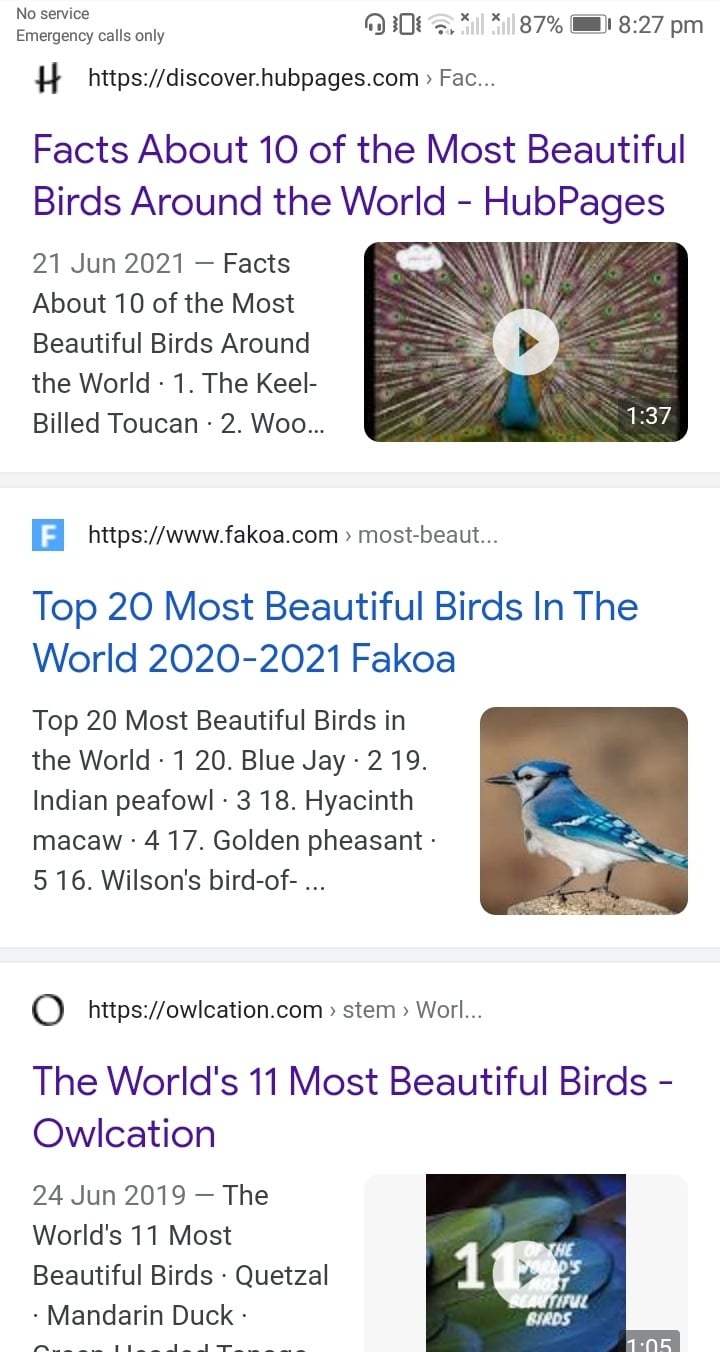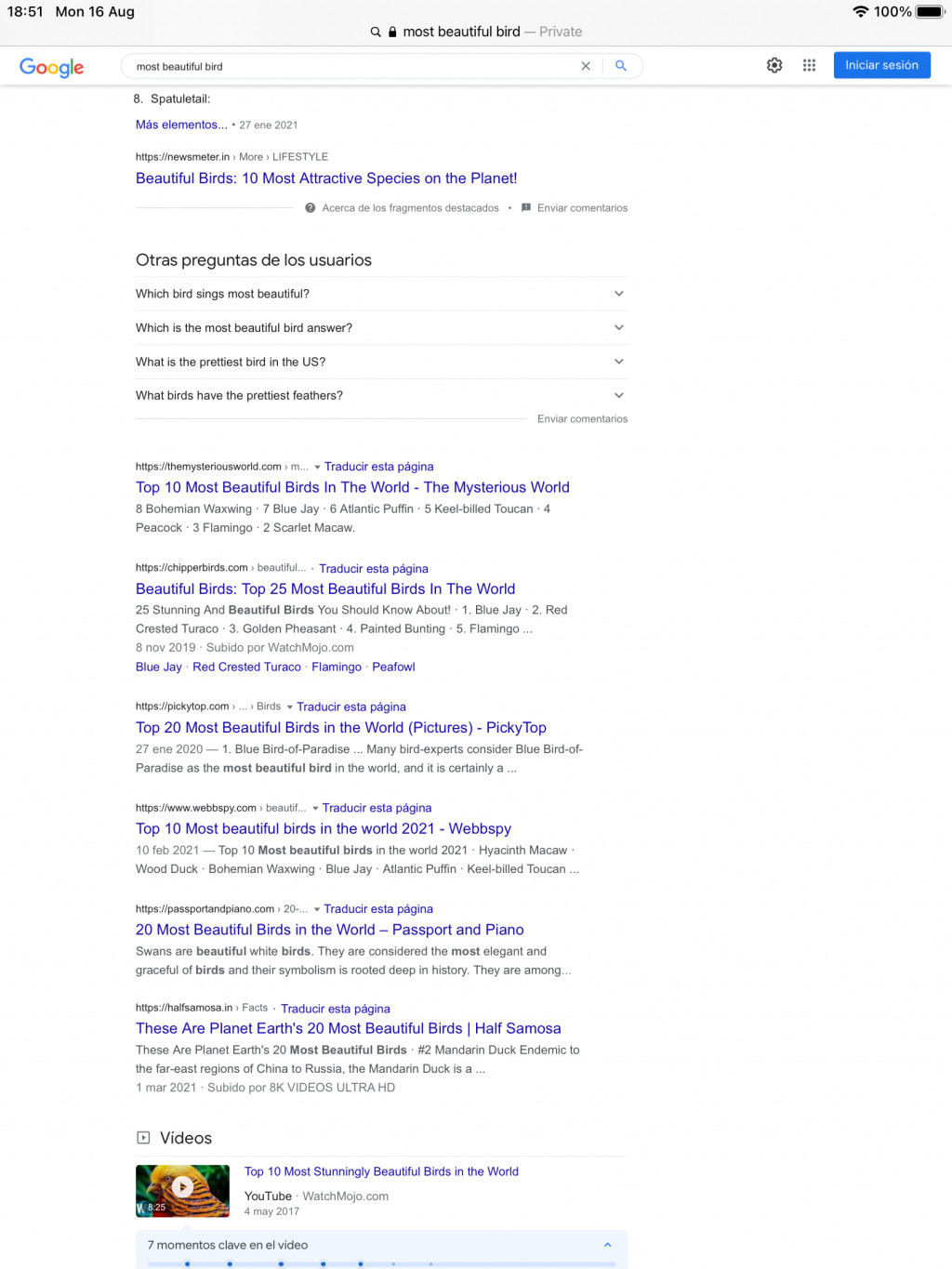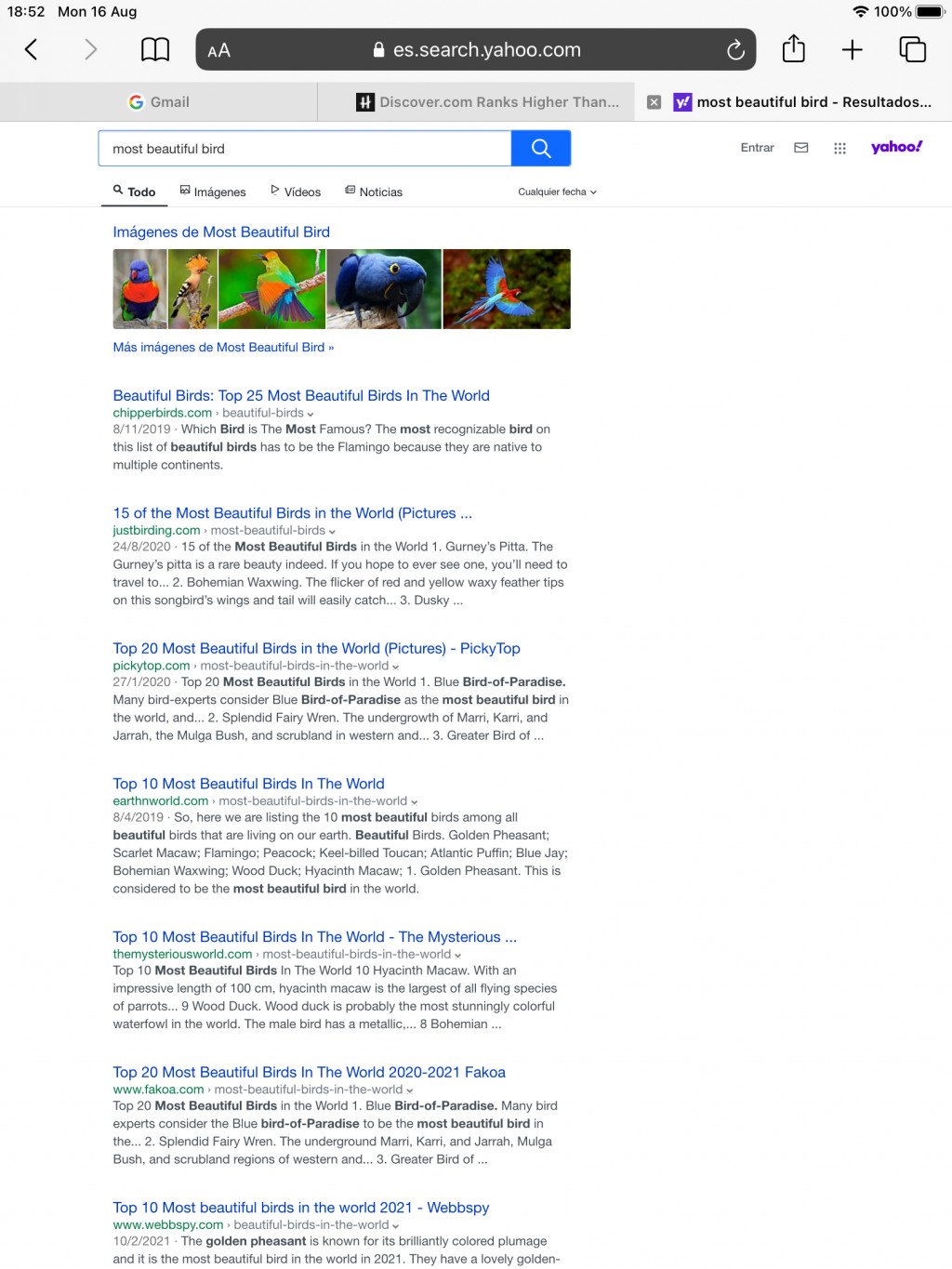Discover.com Ranks Higher Than The Niche Sites?

I just have seen this one. I have tried to search for “most beautiful bird” but I was surprised that Discover.com is ranked higher than Owlcation on Google. Any thought?I have some Discover articles that bring in some traffic and are doing pretty good in search results. So yes I think Discover articles can do well. But I see what you're saying, if a Discover article does better than a niche site article it pretty much flies in the face of what a lot of people say on the forums. Of course, it's a good idea to take what a lot of people say on the forums with a grain of salt.
I just googled 'most beautiful bird' on Edge and got the Owlcation website (The World's 11 Most Beautiful Birds) on page 2 about halfway down and the Discover website (Facts about 10 of the Most Beautiful Birds Around the World) on page 3 in 3rd position.
Some discrepancy?Chef, did you actually go to a Google to do that search? If you put the search term in the search bar on Edge, then you were using Bing, which is Microsoft’s search engine used in their Edge browser by default.
I as Jodah searched Worlds Most Beautiful Birds using Firefox. The Discover article was #2 on page two of search and Owlcation was #4 article on the same page.
I searched Beautiful Birds and the Discover article was #10 on page four and the Owlcation article #1 on page five. One thing to note is a Pinterest link was #3 on page one.Just used Microsoft Bing to search, "most beautiful birds," and I can't find anything from any HP affiliate in the SERPs.
Deleted
Deleted
Deleted
You weren't invited to this party. Take your spam and peddle it elsewhere.
I searched ‘Worlds Most Beautiful Birds’ on Safari, and the Discover one was three places higher than the Owlcation one.
I used the same search term on Google, John. The owlcation article, "The World's 11 Most Beautiful Birds" ranks number two on page two. The discover article, "Facts About 10 of the Most Beautiful Birds Around the World" comes in at third on page two.
When searching "most beautiful bird" on Google, the owlcation article comes in at eighth on page two. The discover article come in at number four on page three.
Google ranks the owlcation article above the discover article for both search terms.
Jodah, Safari is not a search engine. Which search engine did you use?
From what I see in this entire thread is that Google ranks Discover lower than Owlcation. The reports to the contrary did not indicate which search engine they were using.
Yes, correct Glenn. For search term 'most beautiful bird' the Owlcation ranks higher than the Discovery when googled.
The only time I really saw the Discover article above the niche site article was if I actually put in top 10, 10 most beautiful, or added around the world. If I simply searched most/top beautiful birds, the niche site article usually appeared first. It really depends on what keywords are typed in, because the titles are slightly different.
When I searched most beautiful birds around the world, the Discover article was on page one and Owlcation was on the top of page two. However, if I simply searched most beautiful birds the Owlcation article shows up first and two spots down is the Discover article both on page two.
I used startpage when I initally searched which I think is similar to Google results. When I tried most beautiful birds on Bing, Discover was on the top half of page two and Owlcation was on the bottom of page four. Same term on Google brought up Owlcation first and then Discover down two spots both on the top of page two.I guess I see something different. Searching for "most beautiful birds in the world" I see Discover outranking Owlcation when using Google, Bing, and Duckduckgo. In fact, with Duckduckgo I see several Discover pages before coming across an Owlcation page.
When I search "Most beautiful bird" I see Owlcation barely outranking Discover with Google, and Discover outranking Owlcation with Bing and Duckduckgo.
So, what does this mean? Maybe:
~ Owlcation's authority is faltering. That would be unfortunate.
~ Discover's authority is rising. That wouldn't be a bad thing.
~ A little bit of both.
Both sites feature a wide mix if content, so neither are truly "niche". I would be interested in seeing something like this happen with, say, PetHelpful. I suspect it wouldn't.
The articles I saw on Discover weren't bad, though I only glanced. Perhaps they are just outranking the Owlcation content on their own merits. If Discover has become a competitor to at least some of the niche sites I don't see that as a bad thing.
Finally, (@Eric) based on the dates on the articles I didn't think this was the case, but has your article recently moved to Owlcation? If so, forget everything I just said. That would explain it all.The results in this thread are inconsistent because everyone is using different search settings and different search engines.
Both Google and Bing use your previous search activity to return more personal results in the SERPs. So everyone’s results will vary based on if you have “Show personal results” enabled or disabled in your Google settings or “Show news and interests” in your Bing settings.
Click “settings” at the bottom of Google, and then click “manage” under “Personal results.”
If you’re using Bing, their algorithm will also show results based on previous search interests, unless you disable “Show news and interests” in your Bing settings.
Disabling personal results is the only way to make the comparisons in this thread meaningful.Glenn, I don't have "Personal Results" in my Google settings. Is it called something else, perhaps?
The settings are at the bottom of Google when you use it on a desktop or laptop.
I don't see that, Glenn. I see Settings (three vertical dots) at the top of the tab to the right of my profile pic.
Three vertical dots is how it looks on the Google app, so that must be what you’re using. I just use web based Google, but the settings option should have the same options.
I'm unable to find these options on my desktop as well, Glenn. Only settings I can find for searches concern data tracking, and reporting sites that pop up as unknown to google so they may refine their searches for others.
Are you using Google.com? Are you logged in to your Google account? If you’re not logged in, you won’t see the settings option.
I’m logged in all the time, so when I use Google, I’m automatically in my account. That goes for GA also.Same here, but the only settings tool I see is at the top to the right of my profile pic.
I thought that was what startpage was for? I can't remember who, but I thought you or Brandon said if we wanted to see true search results or at least more closely related to what other people would see startpage was the place to search? Or would searching in incognito work? I did all my searches incognito including startpage to eliminate personalized search. When trying to figure out if my articles have fallen I've always used startpage.
I'll have to look at my settings. I never changed anything so I'm assuming they are personalized.
I'm curious though, if I don't actively read on Owlcation or Discover and generally pass up other known Maven owned sites do you know how that would affect search results? If I have content on those sites, but don't actually read those sites or frequent them through search often? Obviously big names like SI would still appear at the top but would that lower where I see other sites like Pethelpful for example where there are other big names not apart of the Maven/HP family?Your search results are not related to what you have published. It’s related to what you read via your search.
That's what I thought, just wanted to make sure.
In regards to startpage, does that save your search history? Is there a better way to see where my pages might be ranking for other people's searches? I know I can look at GA and get some stats there, but I'm curious to see where certain pages rank. I've always used startpage for that, now I'm wondering if that's not accurate either?In response to your two questions…
I don’t use startpage and haven’t studied their method, so I can’t answer that. I would suggest you take a look at its settings to see if you find anything related to getting only personal results, as Google and Bing do by default.
There is no way to see the order of how your pages (articles) are listed in the SERPs for other people’s searches. Correct me if I misunderstood your question. I think that’s what you meant. The reason is that your personal history of searches you’ve done is different from that of others.Yes that is what I meant thanks for the info! I always thought if I saw it on page 1 or 2 for example that is where others would as well. I didn't realize personalized searches could change the results so much from person to person.
I did find how to turn off personal results on Google, but if I understood you correctly that still would not really give me any indication of other people's searches since most are likely searching with theirs on.
That's why I included searches with Duckduckgo. That seemed to have the worst instances of Discover outranking Owlcation.
Normal humans (you know, not writers) out in the world aren't going to disable their personal results, so if Owlcation and Discover are that close in ranking chances are they will see what some of us are seeing. I think there is something more to it than settings.
But whatever. It kind of doesn't matter.
I think you missed the point, Eric. Even though most people out in the world don’t disable their personal settings, that will not cause them to have the same results as we have when we allow personal results in our search.
Their results will still be based on their own personal search history, which would undoubtedly be different from what you or I would have searched for online. So results will be different for each individual.
DuckDuckGo doesn’t save search history, so that could be the closest thing to getting a consistent comparison among all of us.
To be honest Discover consistently generates more traffic for me than any niche site
A quick, unscientific search on Google for "most beautiful bird" by myself has neither result highlighted on the first page of results. I can't see either getting much traffic, as it's the top 5 results that really matter imho.
I thought this thread was going to be about domain comparison, which would have been more significant. There's no reason why Discover shouldn't beat Owlcation in some circumstances, especially with the lower rankings.I get Owlcation on 2nd page of SERPs in 10th place and Discover on 3rd page in 6th place for search term "most beautiful bird in the world".
For "most beautiful bird" Owlcation is #9 on page 2, Discover is #7 on page 3.
Which is all kind of a relief to me because I just submitted an article to Owlcation and it was on Discover.
Seems to me the general rule that niche sites perform better is still true. But I don't think anyone can know without quantitative data that is not anecdotal, which I'm sure HP has.I agree. One swallow does not a summer make, as they say.
That said, I'm sure there are lots more examples of Discover outranking niches. But it doesn't mean it's a general rule, or that you don't want your articles to be in the topic-based niches.If I compare my articles that are still on Discover with the ones on niche sites, my niche site articles perform better. And often with fewer articles.
Related Discussions
- 67
I found keyword with no competition but massive traffic
by Gary Anderson 10 years ago
But I am wondering why there seems to be competition in the real google world and no competition showing for it in the external keyword tool world?
- 337
Allow Member HTML codes for Hubpages Hosted Advertising
by FootballNut 9 years ago
With the Ad Program service Hubpages offer, to benefit all writers and Hubpages what is the possibility of allowing Hubpage members access to the hosted Adverts in the Hubpages Ad Program?Is there potential that members of this site can add the hosted adverts HTML codes/javascripts on their own...
- 15
Is there a quick way to check where you rank in Google?
by Nathan Bernardo 5 years ago
Without having to sift through pages and pages of search results, is there a way to find out where your article/keyphrase is in the search engine?
- 17
Free SEO Keyword Research Resources Beyond the Basics
by Butch Tool 10 years ago
Hello, dear fellows, I am hoping that someone with more experience may be able to direct me to any free resources that will help me learn how to become an SEO master. Primarily, I want to learn how to do in-depth keyword research to pick great niches to write about that have a high payment on...
- 60
Have you "Google Image" Searched your Profile name?
by Tony Sky 17 years ago
I have Searched a few of you hubbers profiles names on Google images and some of you are not on the 1st page..Some of you have more than one pic, and some have there pic and other hubbers pics!!...Which other hubbers are on your page and how many pics are there of yours?I have 2
- 21
What would be next to learn after the learning center?
by tsmog 10 years ago
Having been on HP now for more than four years while kinda' inactive for the last two I am looking more closely. I have cleaned up my portfolio from over 100 hubs with low views to now about 10. I had a lean of writing more for self than as a business venture seeking a niche. Now, I am looking more...




















